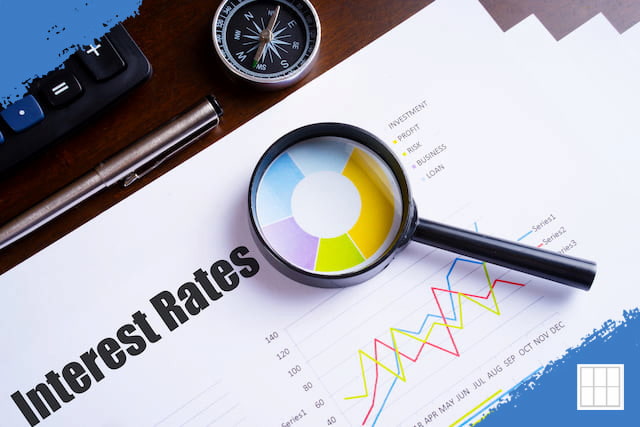Imagine this: You're a Kansas City home buyer scrolling Zillow late at night, dreaming of…

Factors That Can Affect Your Interest Rate
The current mortgage rates Kansas City, along with other factors, can significantly impact your monthly payment, the total cost of your home loan, and your purchasing power. Understanding the key factors influencing mortgage rates, including those specific to Kansas City, is essential.
Everyone likes to pay less for things, and your interest rate is no exception. Here are nine key factors that could affect the interest rate you’re offered on a mortgage. Some of them may be within your control, while others are not.
Credit score factors that can affect your interest rate
Your credit score is one of the factors that can affect your interest rate. Consumers with better credit scores pay lower interest rates, while those with worse credit pay higher rates. Your credit scores help lenders determine how likely you are to repay a loan. Your credit report, which contains details about your credit history, including your loans, credit cards, and payment history, is the basis for calculating your credit score.
Checking your credit score is a smart move before applying for a mortgage. Knowing your credit score will help determine what kind of mortgage rate you qualify for and whether you need to work on raising your score before applying.
Your credit score is a three-digit number that indicates to lenders how likely you are to pay back your debts. FICO is the most popular credit scoring system, and it gives you a score between 300 and 850 based on your credit history.
An excellent credit score is generally regarded as above 740, while 700 is considered good. Below a 620 credit score is considered risky, and 580 and below is rated inadequate. And there are milestones in between, with each step down reflecting higher rates or loan costs.
There are a few ways to check your credit score. You can obtain your FICO score directly from the credit reporting agencies, such as Equifax, Experian, and Transunion – but you’ll often have to pay for it.
Your credit scores differ from your credit reports, which are the records the three agencies keep.
You are also entitled to a free copy of your credit report from each bureau annually. It’s a good idea to verify if there are errors – you can get them through the official site, www.annualcreditreport.com, which the agencies maintain.
Lastly, many credit card companies and banks now include your credit score on your monthly statement. The score reported is a FICO score; mortgage lenders do not use other scoring models.
Your credit score can also cost you higher homeowners insurance and private mortgage insurance premiums if you put in less than a 20% down payment.
The location of the home
The interest rates for mortgages vary between states. A recent survey found that the average affect on the interest rate in Rhode Island was .71 percent lower than the average rate in Nebraska. Your mortgage rate will depend on where you live.
The mortgage amount
You may also pay a higher interest rate if you take out a small mortgage loan. Lenders take on more risk when lending a small amount of money, therefore charging a higher interest rate. For example, your interest rate may be higher for a small loan amount, such as $50,000 or less.
Mortgage loans that exceed the conforming limit, called Jumbo Loans, will have a higher interest rate.
Down payment factors that can affect your mortgage rate
Your down payment is another factor that can affect your interest rate. Typically, a larger down payment means a lower interest rate. Lenders have a lower level of risk when borrowers have more money invested into the property.
This is especially beneficial to those looking to purchase a home, as they can save money in the long run. Do it if you can comfortably put 20 percent or more down on a property. You’ll usually get a lower interest rate.
Lenders usually require you to purchase mortgage insurance if you cannot make a down payment of 20 percent or more. This insurance helps protect the lender if you cannot make your mortgage payments and subsequently default on your loan.
Lenders refer to the down payment in terms of loan-to-value (LTV). Simply put, it’s the loan amount divided by the value. For example, a loan amount of $90,000 with a home value of $100,000 would result in a 90% LTV.
The cost of mortgage insurance varies based on your loan amount, credit score, and other factors, but typically costs between 0.2 and 1.3 percent of your loan amount per year.
Once you have built up enough equity in your home, you can cancel your private mortgage insurance and reduce your monthly payments. You must contact your lender to cancel your private mortgage insurance, and the lender will likely require you to provide proof of your equity in the home.
Loan term affects your rate
The loan term is how long you have to repay the loan. Generally, a short-term loan, like a 15-year loan, offers a lower interest rate but higher monthly payments than a 30-year fixed. Ideally, the shortest term and lowest interest rate save you the most money.
The cost of borrowing money over time is more important than the interest rate. For example, a long term 30-year mortgage at 4% costs 2.2 more than a 15-year mortgage at the same rate.
Interest rate type can be an affect
Interest rates come in two primary loan types: a fixed rate and an adjustable-rate mortgage, which can affect your interest rate. Fixed interest rates don’t change over time; adjustable rates go up or down after the introductory period. Adjustable Rate vs. Fixed Rate is a critical consideration as the adjustable rate might increase significantly later.
The Loan Type is also an impact
Mortgage rates can vary based on the type of loans, such as Conventional, FHA, USDA, and VA loans. During pre-approval, lenders can determine which loan products offer the best lending terms for your situation, and rates can differ significantly depending on your loan type.
The Property type
The type of property can also play a role in determining your interest rate. Here are some examples, an investment property (non-owner occupied), two-to-four unit property, condominiums, and second homes. The risk associated with these properties is more significant than an owner-occupied single-family residence.
Paying Points affects the interest rate
Paying points is one of the factors that can affect your interest rate. Mortgage points are the fees a borrower pays a mortgage lender to get a lower interest rate on loan, known as “buying down the rate.” Each point the borrower buys costs 1 percent of the mortgage amount; one point on a $300,000 mortgage would cost $3,000.
Each point typically lowers the rate by 0.25 percent, so one point would lower a mortgage rate from 4 percent to 3.75 percent for the life of the loan. How much each point reduces the rate varies among lenders, however. The rate-reducing power of mortgage points also depends on the type of mortgage loan and the overall interest rate environment.
In Conclusion
Interest rates are always on borrowers’ minds, and for a good reason. Your interest rate can significantly impact your monthly mortgage payment and the total cost of your loan. That’s why it’s essential to understand all the factors in setting your rate.
There are also outside influences that impact rates daily. Such as the high inflation, economic growth, real estate market conditions, stock market, central banks, goods and services, and fed raised rates. These are all things that can influence rising interest rates.
This blog post has outlined eight key factors that affect interest rates. By understanding each of these components, you can take steps to make yourself a more attractive borrower and get the best possible mortgage rate quote. Are there any particular factors that stand out to you? Start working on them today so you can secure the best mortgage deal when it comes time to buy your dream home.



